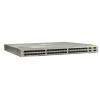-
zł

Cisco Nexus N3K-C3064PQ-10GX is a managed Layer 2/3 switch. It is equipped with 48 SFP + slots (100 Mb/s / 1Gb/s / 10Gb/s bandwidth) and 4 QSFP + slots (10/40 Gb/s bandwidth). The device has a housing suitable for installation in a 19 "rack, the height is 1U. It has 2 power supplies that work redundantly - in the event of a failure, one of the other is responsible for the power supply. Available power options: 2x AC adapter (100 - 240 V AC), 2x power supply DC (40 - 72 V DC) or AC + DC power supply.
The maximum switching capacity is 1.28 Tbps and the packet forwarding speed is 950 Mpps. The switch supports many Layer 3 routing functions, including BGP and OSPF. In addition, it has all the necessary Layer 2 functions and is perfect for multicast support.
The kit includes reinforced Rack handles.
The most important features:
| Nexus N3K-3064PQ-10GX | |
| General physical properties |
19 "1U Rack Case 48 SFP slots supporting 1/10 Gb / s bandwidth 4 QSFP + slots supporting 10/40 Gbps bandwidth 2 redundant power sources Fans |
| Efficiency |
Switching capacity: 1.28 Tb/s Packet forwarding speed: 950 Mp/s Line-rate traffic on all ports (Layer 2 and 3) MTU - 9216 (jumbo frames) |
| Hardware Properties | |
|---|---|
| MAC addresses | 128000 |
| VLANs | 4096 |
| Spanning-tree instances |
RSTP: 512 MST: 64 |
| ACL entries |
2000 ingress 1000 egress |
| Routing table |
16,000 prefixes / 16,000 host entries 8000 multicast routes (data depends on the software version) |
| Number of EtherChannels | 64 (z vPC) |
| Number of ports on EtherChannel | 32 |
| Buffer | 9 MB (shared) |
| Boot flash memory | 2 GB |
| Power | |
| Number of power supplies | 2 |
| Types of power supplies | AC |
| Average power consumption |
143 W with Twinax at 100% load 177 W with SR optics at 100% load |
| Maximum power consumption | 199 W |
| AC power supply |
100 - 240 V AC 50-60 Hz Efficiency 89 - 91% at 220 V |
| Maximum heat development |
488 BTU / hr (Twinax / 100% load) 605 BTU / hr (SR optics / 100% load) |
| Maksymalne heat development | 683 BTU/hr |
| Other and environmental features | |
| Volume |
Fan at 40%: 59.7 dBA Fan at 60%: 66.4 dBA Fan at 100%: 71 dBA |
| Dimensions |
Height: 4.4 cm Width: 43.9 cm Length: 50.5 cm |
| Weight | 9,3 kg |
| Operating temperature | 0 to 40 °C |
| Storage temperature | -40 to 70 °C |
| Operating humidity |
10%-85% non-condensing At maximum humidity, the switch can work for up to 5 days |
| Storage humidity | 5%-95% non-condensing |
| Software features | |
| Layer 2 | Layer 2 switch ports and VLAN trunks IEEE 802.1Q VLAN encapsulation Support for up to 4096 VLANs Rapid Per-VLAN Spanning Tree Plus (PVRST+) (IEEE 802.1w compatible) Multiple Spanning Tree Protocol (MSTP) (IEEE 802.1s): 64 instances Spanning Tree PortFast Spanning Tree Root Guard Spanning Tree Bridge Assurance Cisco EtherChannel technology (up to 32 ports per EtherChannel) Link Aggregation Control Protocol (LACP): IEEE 802.3ad Advanced PortChannel hashing based on Layer 2, 3, and 4 information vPC Jumbo frames on all ports (up to 9216 bytes) Storm control (unicast, multicast, and broadcast) Private VLANs |
| Layer 3 | Layer 3 interfaces: Routed ports on interfaces, switch virtual interfaces (SVIs), PortChannels, and subinterfaces (total: 1024) 64-way ECMP 2000 ingress and 1000 egress ACL entries IPv6 routing: Static, OSPFv3, and BGPv6 Routing protocols: Static, RIPv2, EIGRP, OSPF, and BGP Bidirectional Flow Detection (BFD) for BGP, OSPF and ipv4 Static routes HSRP and VRRP ACL: Routed ACL with Layer 3 and 4 options to match ingress and egress ACLs VRF: VRF-lite (IP VPN), VRF-aware unicast (BGP, OSPF, and RIP), and VRF?aware multicast Unicast Reverse-Path Forwarding (uRPF) with ACL; strict and loose modes Jumbo frame support (up to 9216 bytes) Generic Routing Encapsulation (GRE) tunneling |
| Multicast |
Multicast: PIMv2, PIM-SM, and SSM Bootstrap router (BSR), Auto-RP, and Static RP Multicast Source Discovery Protocol (MSDP) and Anycast RP Internet Group Management Protocol (IGMP) Versions 2 and 3 |
| Quality of Service (QoS) |
Layer 2 IEEE 802.1p (class of service [CoS]) 8 hardware queues per port Per-port QoS configuration CoS trust Port-based CoS assignment Modular QoS CLI (MQC) compliance ACL-based QoS classification (Layers 2, 3, and 4) MQC CoS marking Differentiated services code point (DSCP) marking Weighted Random Early Detection (WRED) CoS-based egress queuing Egress strict-priority queuing Egress port-based scheduling: Weighted Round-Robin (WRR) Explicit Congestion Notification (ECN) Configurable ECN (Marking) per port |
| Protections | Ingress ACLs (standard and extended) on Ethernet Standard and extended Layer 3 to 4 ACLs include IPv4, Internet Control Message Protocol (ICMP), TCP, and User Datagram Protocol (UDP) VLAN-based ACLs (VACLs) Port-based ACLs (PACLs) Named ACLs ACLs on virtual terminals (vtys) DHCP snooping with Option 82 Port number in DHCP Option 82 DHCP relay Dynamic Address Resolution Protocol (ARP) inspection Configurable CoPP |
| Cisco Nexus Data Broker | Topology support for tap andSPAN aggregation Support for QinQ to tag input source tap and SPAN ports Traffic load balancing to multiple monitoring tools Traffic filtering based on Layer 1 through Layer 4 header information Traffic replication and forwarding to multiple monitoring tools Robust RBAC Northbound Representational State Transfer (REST) API for all programmability support |
| Management | POAP Python scripting Cisco EEM Switch management using 10/100/1000-Mbps management or console ports CLI-based console to provide detailed out-of-band management In-band switch management Locator and beacon LEDs Configuration rollback SSHv2 Secure Copy (SCP) server Telnet AAA AAA with RBAC RADIUS TACACS+ Syslog Syslog generation on system resources (for example, FIB tables) Embedded packet analyzer SNMP v1, v2, and v3 Enhanced SNMP MIB support XML (NETCONF) support Remote monitoring (RMON) Advanced Encryption Standard (AES) for management traffic Unified username and passwords across CLI and SNMP Microsoft Challenge Handshake Authentication Protocol (MS-CHAP) Digital certificates for management between switch and RADIUS server Cisco Discovery Protocol Versions 1 and 2 RBAC Switched Port Analyzer (SPAN) on physical layer, PortChannel, and VLAN Tunable Buffer Allocation for SPAN Encapsulated Remote SPAN (ERSPAN) Ingress and egress packet counters per interface PTP (IEEE 1588) boundary clock Network Time Protocol (NTP) Cisco OHMS Comprehensive bootup diagnostic tests Cisco Call Home Cisco DCNM Advanced buffer utilization monitoring sFlow |
| MIB |
Generic MIBs ? SNMPv2-SMI ? CISCO-VLAN-MEMBERSHIP-MIB ? ENTITY-MIB Monitoring MIBs ? NOTIFICATION-LOG-MIB ? CISCO-AAA-SERVER-MIB ? CISCO-LICENSE-MGR-MIB ? UDP-MIB |
| Standards | IEEE 802.1D: Spanning Tree Protocol IEEE802.1p: CoS Prioritization IEEE 802.1Q: VLAN Tagging IEEE 802.1s: Multiple VLAN Instances of Spanning Tree Protocol IEEE 802.1w: Rapid Reconfiguration of Spanning Tree Protocol IEEE 802.3z: Gigabit Ethernet IEEE 802.3ad: Link Aggregation Control Protocol (LACP) IEEE 802.3ae: 10 Gigabit Ethernet (Cisco Nexus 3064-X) IEEE 802.3ba: 40 Gigabit Ethernet IEEE 802.3an:10GBASE-T (Cisco Nexus 3064-T and 3064-32T IEEE 802.1ab: LLDP IEEE 1588-2008: Precision Time Protocol (Boundary Clock) |
| RFC |
BGP ? RFC 1997: BGP Communities Attribute ? RFC 2328: OSPF Version 2 ? RFC 1724: RIPv2 MIB Extension ? RFC 2236: Internet Group Management Protocol, version 2 |
| Security | UL 60950-1 Second Edition CAN/CSA-C22.2 No. 60950-1 Second Edition EN 60950-1 Second Edition IEC 60950-1 Second Edition AS/NZS 60950-1 GB4943 |
| EMC |
47CFR Part 15 (CFR 47) Class A EN55024 |






 Polski
Polski English
English Italiano
Italiano Español
Español Čeština
Čeština Српски
Српски Deutsch
Deutsch Ελληνικά
Ελληνικά Slovenský
Slovenský




